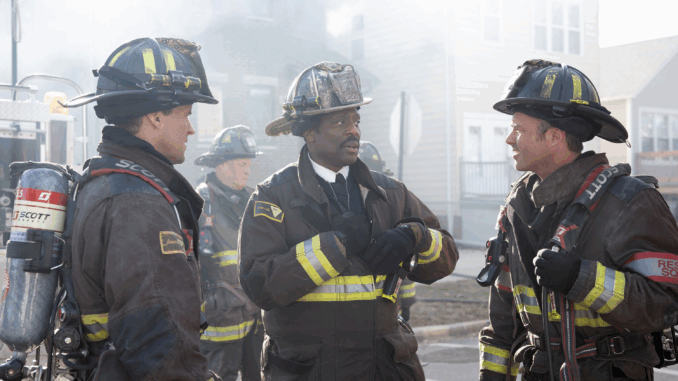
Chicago Fire has always excelled at delivering intense procedural action wrapped in deep, character-driven drama. But Season 14 isn’t just another year in the life of Firehouse 51; it’s a watershed moment that fundamentally redefines the team dynamic and raises the stakes higher than ever before. The season premiere, and the storylines it introduced, confirm that the beloved crew must navigate a trio of monumental challenges: a shocking goodbye from a fan-favorite, the immediate tension brought by a rebellious new recruit, and a citywide budgetary crisis that threatens the very existence of the CFD as they know it.
This combination of personal loss, internal friction, and external systemic threat ensures that Season 14 will be the house’s biggest test yet, forcing the firefighters and paramedics to fight not only fires but also politics and personal demons.
The Shocking Goodbye: Darren Ritter’s Emotional Exit Arc
While the farewells of Carver (Jake Lockett) and Damon (Michael Bradway) were abrupt, the most emotional and impactful goodbye of Season 14 is reserved for Darren Ritter (Daniel Kyri). A stable presence on Engine 51 and the protective protégé of Lieutenant Herrmann, Ritter’s departure is a devastating loss for the firehouse family, particularly given the suddenness of the news related to actor contract decisions.
The show, however, has set up a tender, narrative-driven reason for his exit. The Season 14 premiere saw Ritter rush off to New York City to be by the hospital bedside of his ex-boyfriend, Dwayne, who was shot. This establishes a clear emotional imperative for Ritter to leave Chicago and prioritize his personal life and love story.
Why This Exit Works
Unlike a tragic on-the-job death, Ritter’s departure on the grounds of love and support provides a much-needed sense of hope and closure.
- It honors Ritter’s character arc—a compassionate man who struggled with his identity but grew into a confident firefighter—by giving him a peaceful, self-actualized exit.
- It leaves the door open for future guest appearances, allowing him to return to visit his 51 family, a crucial component for keeping the One Chicago universe cohesive.
- Most importantly, it generates emotional friction for Herrmann and Mouch (now the new Engine 51 Lieutenant), who must cope with losing their stable, dedicated teammate just as the firehouse enters a period of severe instability.
The Rebellious New Recruit: Sal Vasquez Joins Truck 81
The vacancies on Truck 81 and Engine 51 are filled almost immediately, but the new arrival on Truck 81 is less a replacement and more a catalyst for drama. Enter Sal Vasquez (Brandon Larracuente), the new firefighter who has been introduced as a “rebel” and a “bad boy” with a history of clashing with authority.
Vasquez’s presence is intended to create instant, high-stakes tension, particularly with his new boss, Lieutenant Stella Kidd (Miranda Rae Mayo).
A Challenge to Kidd’s Leadership
Kidd is dealing with profound personal turmoil following her miscarriage and the sudden, complex possibility of fostering a teenager. Her frustration and desire for control will immediately clash with Vasquez’s arrogant confidence and tendency to “go rogue” during calls. Showrunners have teased that Vasquez’s placement at the prestigious Firehouse 51 is a “favor” to Chief Dom Pascal, adding a layer of unwanted political baggage to the new recruit.
Vasquez represents a major leadership test for Kidd. She must figure out how to manage a volatile but talented subordinate, harnessing his skills while keeping him and the entire crew safe. This internal conflict—a dynamic that echoes Severide’s early challenges—will likely dominate Truck 81’s storyline, pushing Kidd to her limits as both a leader and a firefighter.
Firehouse 51’s Biggest Test Yet: The City Budget Crisis
The most pervasive and dangerous threat of Season 14 is not a rogue arsonist or a gas leak, but the city itself. The premiere introduced a major plot line surrounding severe budget cuts that have crippled Chicago’s emergency services.
The immediate impact has been staggering: reports state that nearly 50% of 911 calls are going unanswered due to staffing shortages. The cuts are now hitting the CFD, foreshadowing potential firehouse closures and brownouts (temporary unit decommissioning).
A Systemic Threat to the CFD
This political storyline provides the overarching tension for the entire season, creating the biggest professional test Firehouse 51 has ever faced:
- Increased Danger on Calls: With fewer units and personnel, Firehouse 51 will have to perform with less backup and longer response times, significantly increasing the danger for both the crew and the public. Every shift becomes a high-risk scenario where the margin for error is razor-thin.
- Pressure on Command: Chief Pascal is thrust into a political battle with the Mayor’s office to protect his units, while lieutenants like Kidd and Severide must make agonizing choices on the fireground about where to allocate their resources.
- The Herrmann/Mouch Dynamic: Even the Engine 51 crew is affected. Mouch is trying to settle into his new Lieutenant role, while the demoted Herrmann is facing his own “challenging personal crisis.” The budget cuts may push Herrmann to regret his demotion, adding strain to the strongest friendship in the firehouse.
The core message of Chicago Fire has always been the dedication of the men and women who run toward the danger. In Season 14, that dedication is tested not by fire, but by the relentless, invisible enemy of bureaucracy and political austerity. This challenge is unprecedented, ensuring that Firehouse 51 will have to fight smarter, harder, and together to survive the season.